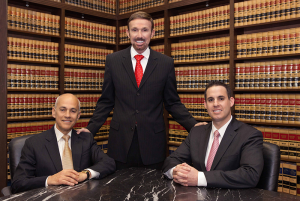Federal Carjacking Laws (18 USC 2119)

Most people know that stealing a car is a crime. We’ve all seen car chases on live TV, our eyes riveted on the screen as a suspect flees from police. Often, the person frantically driving away from law enforcement is suspected of stealing the car he or she is driving. Rarely does this person get away. Officers typically find a way to stop the driver, arrest him or her, and file charges of carjacking and evading a police officer, along with many other crimes.
However, few people know this crime can often be charged on the federal level. Title 18 United States Code 2119 (18 USC 2119) states that it is unlawful for you to take a motor vehicle that has been transported, shipped, or received in interstate or foreign commerce from the person or presence of another by force and violence or by intimidation (or attempt to do so), with the intent to cause death or serious bodily harm. If you are facing federal carjacking charges, you will need the help of an experienced federal criminal defense attorney.
Prosecution of Federal Carjacking Charges under 18 USC 2119
In order for you to be convicted of the federal crime of carjacking, the prosecution must prove beyond a reasonable doubt all of the following:
- You knowingly took a motor vehicle;
- You did so by force and violence or by intimidation;
- The motor vehicle previously had been transported, shipped or received in interstate of foreign commerce; AND
- You intended to cause death or seriously bodily harm at the time you demanded or took control of the motor vehicle.
Sentencing and Punishment for a Federal Carjacking Conviction

If you are convicted of federal carjacking, you face severe punishment. Upon conviction under 18 USC 2119, you face a maximum of 15 years in federal prison, a fine of up to $250,000, or both. If someone suffered serious bodily injury as a result of your carjacking, you face a sentence of up to 25 years in federal prison, a fine of up to $250,000 or both. If death occurs as a result of your act of carjacking, you face a sentence of life imprisonment or death penalty, a fine of $250,000 or both imprisonment and fine.
Possible Defenses to Federal Carjacking Charges
Our knowledgeable federal criminal defense attorneys are experienced in defending those charged with federal carjacking and know effective legal defenses to these charges. These defenses include:
- The motor vehicle never crossed state or national boundaries – If the alleged vehicle never crossed state or national boundaries, you cannot be lawfully convicted of this crime. However, you could be charged with a state carjacking violation. Furthermore, this law only applies to motor vehicles, not “motor vehicle parts.” The vehicle must be completely manufactured before crossing state lines in order for this law to apply.
- The vehicle was not within the driver’s control – If the alleged vehicle was not within the “physical proximity of the victim,” it cannot constitute a carjacking. This statute requires that you took the vehicle b y force and violence or by intimidation. If the driver of the car was not in or near the car at the time it was allegedly taken, this does not constitute a violation of federal carjacking laws.
- You did not intend to cause serious bodily injury or death – Your attorney may be able to show the court that you did not intend for serious bodily injury or death to occur as a result of your actions. Say, for example, you stole the vehicle by pointing a gun at the driver and he or she complied with your demands, allowing you to take the car without use of force or violence. As you drove away, the driver was struck by another car and is killed. In this case, your attorney may be able to show the court that your actions do not demonstrate any sign of intent to cause injury or death and that your actions were not the direct cause of the driver’s death. Thus, if the prosecution cannot prove that you had the required intent, you should not be convicted of this crime.
FAQs Regarding Federal Carjacking
At Wallin & Klarich, we frequently receive questions from those face federal carjacking charges. These include:
What if the car had been manufactured and transported within California, but had only left the state while the owner had been traveling on vacation?
This statute requires that the vehicle be transported, shipped or received at any time for the purposes of interstate or foreign commerce. This means that the vehicle must have been transported to California from another state or country during the process of sale, trade or any related business transaction in order for you to be convicted of federal carjacking.
What if I didn’t mean for anyone to get hurt, or die?
How the court will determine your intent, is dependent on the facts of your case. The United States Supreme Court has held that “intent” is measured at the moment you demanded or took control of the vehicle. Thus, if seriously bodily injury or death occurred after you took control of the vehicle, intent cannot be proven. However, this statute applies “conditional intent,” which means that your intent could be presumed under certain conditions. Under this rule, the Supreme Court has decided that, if serious bodily injury or death occurred as a result of the driver’s or passenger’s resistance (i.e. someone fought back to prevent you from stealing the car), it is presumed that you had intent. This rule also applies if you took someone hostage, and later caused serious bodily injury or death. This exception applies because, although intent is measured at the moment you demanded or took control of the vehicle, the act was prolonged due to your act of taking someone hostage. Thus, it is presumed you had intent to cause serious bodily injury or death as a result of taking someone hostage after the carjacking occurred.
What if I just took the person’s car keys from them, then had to run to where the car was before driving away?
Even if you did not directly take the car from the person, just their keys to the car, this still constitutes “carjacking,” under this statute. However, 18 USC 2119 states that you must have taken the car “from the person or presence of another” which means the car must have been in close proximity to the driver at the time it was taken by use of force and violence or intimidation in order to constitute federal carjacking. Otherwise, your actions may constitute grand theft auto.
Call the Federal Defense Attorneys at Wallin & Klarich Today

If you or a loved one has been charged with federal carjacking, you need to contact an experienced criminal defense attorney immediately. At Wallin & Klarich, our skilled federal criminal defense attorneys have been successfully defending clients facing federal criminal charges for over 40 years. We’ve helped thousands of clients in their time of legal need, and we can help you, too.
With offices located in Los Angeles, Sherman Oaks, Torrance, Orange County, San Diego, Riverside, San Bernardino, Ventura, West Covina and Victorville, there is an experienced Wallin & Klarich criminal defense attorney available to help you no matter where you work or live.
Call us today at (877) 4-NO-JAIL or (877) 466-5245 for a free phone consultation. We will be there when you call.

